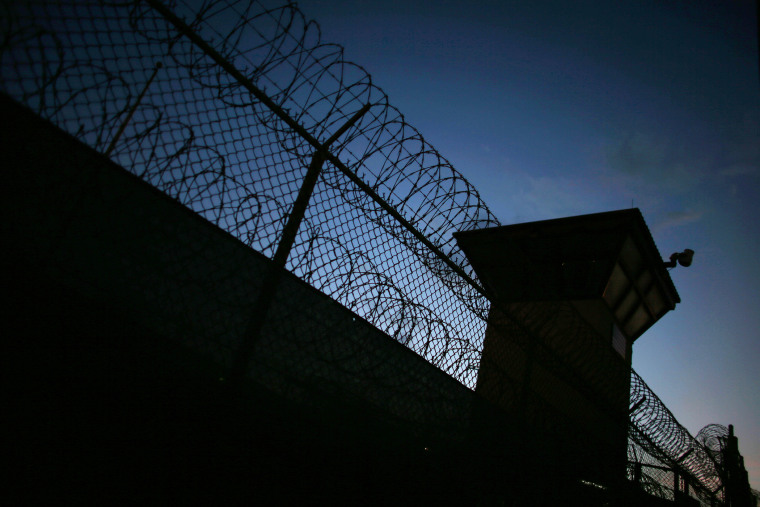With Congress showing no willingness to close the Guantanamo Bay detention facility, President Barack Obama likely has just one option to make good on his election pledge before leaving office — shutting the controversial and costly Cuban facility by executive order.
But while Obama has shown a willingness to wield executive power in the face of congressional inaction on issues such as immigration and background checks on gun sales, most legal experts interviewed by NBC News said they don't expect him to go to that well again to close Guantanamo.
Michael Greenberger, a former Justice Department attorney now teaching law at the University of Maryland, said such a decision would be the result of political calculation in the midst of a presidential campaign rather than concerns about the constitutionality of such an action.
"The chance of Guantanamo detainees being brought to the U.S. in an environment where you have Republican presidential candidates trying to outdo one another on how many illegal immigrants they're going to deport is very, very small," he said.
Other experts disagree that Obama's authority to shut Guantanamo Bay and transfer the 91 detainees still held there to the U.S is clear cut.
"Does the president through his commander-and-chief powers have unilateral authority to do this on his own?" said Robert J. Spitzer, distinguished service professor of political science at SUNY Cortland. "The answer is no, as long as Congress has acted affirmatively to prevent him from doing that, as it has in this case."
Spitzer was referring to congressional funding restrictions aimed at preventing Guantanamo detainees from being transferred to the U.S., legislation that was signed by Obama.
Hina Shamsi, director of the ACLU's national security project, took a third path, saying that issuance of an executive order would be legally problematic, but not a clear-cut violation of the Constitution.
"Seeking to transfer people, given the congressional restrictions that are in place, would raise significant constitutional concerns," she said. The presence of the detainees on U.S. soil also would raise new legal questions about their indefinite detention, she noted, since laws governing battlefield detainees differ from those governing criminal defendants.
But Spitzer, the author of five books on the presidency, including "The Presidency and the Constitution," agreed with Greenberger that Obama is unlikely to issue an executive order and trigger another bare-knuckle political fight with congressional Republicans in the midst of a presidential race.
Instead, he expects the administration will continue to draw down the number of detainees held at Guantanamo Bay Naval Base by continuing to transfer those deemed no danger to the U.S. to home countries, then strike a deal with congressional Republicans to transfer the small number of suspected terrorists to the U.S. to stand trial - either in federal courts or before military commissions.
"I think you can make a fair argument that even the Republicans in Congress could believe that finding ... (an) accommodation with him may be in their long-term interest," Spitzer said.
If the president does surprise the prognosticators and take executive action to close Guantanamo, fulfilling a campaign pledge he made in 2008, there is little doubt the matter would soon end up in federal court.
In that case, arguments would largely focus on Article II of the Constitution, which outlines the power of the commander and chief in times of war.
Allies of the administration, ex-White House counsel Gregory Craig and Cliff Sloan, a former special envoy for Guantanamo closure, outlined what would likely be the centerpiece of the administration's argument in such a case in an op-ed in the Washington Post in November:
"The Constitution assigns Congress the important power to 'declare war.' But Article II designates the president as 'Commander in Chief' of the military. Recognizing that the president needs flexibility to select among tactical options in the conduct of war," they wrote, arguing that the congressional restriction on funds for transfer of detainees to the U.S. was therefore "plainly unconstitutional."
But Spitzer notes that Obama "has never said in seven-and-a-half years in office that his commander-in-chief power gives him that degree of autonomy and independence," adding that "the view that the president has unilateral power and that Congress doesn't have a right to contradict that is not one that's widely held."
In what would be another twist in the long-running debate over the extent of America's extra-judicial powers to fight terrorism, Spitzer noted that such a court case — if it is ever filed — could end up being decided by a federal appellate court rather than the Supreme Court.
Because of the recent death of Justice Antonin Scalia, he said, the ideologically divided court could easily split four to four if his successor was not yet confirmed. That would mean the lower court's ruling — whatever it was — would be affirmed without comment by the nation's highest court.
"It's an additional wildcard in this process if it goes to court," he said.
This story originally appeared on NBCNews.com.
